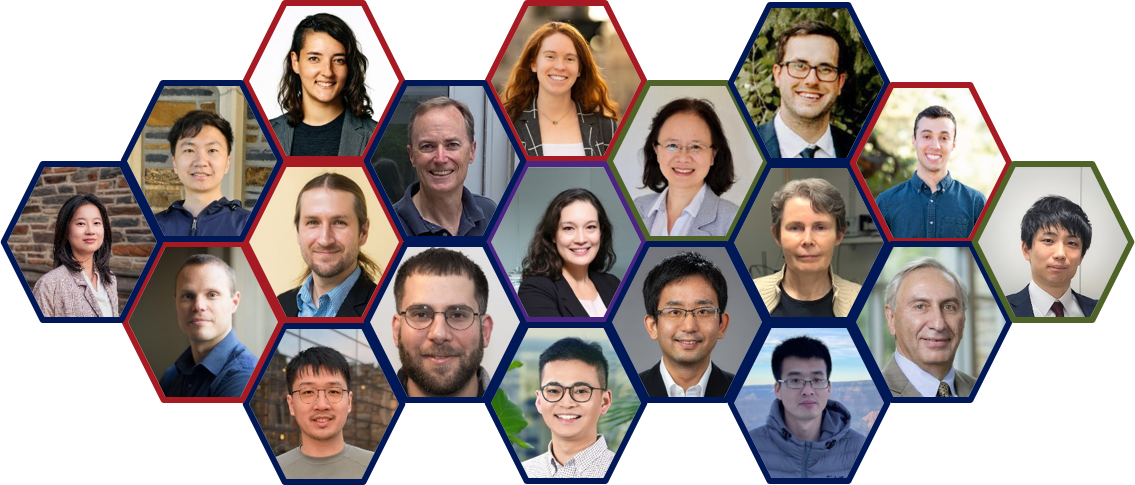Hokkaido University scientist recognized in award from the Royal Society of Chemistry
University News | June 12, 2024
The NSF Center for Molecularly Optimized Networks team, of which Professor Jian Ping Gong of the Faculty of Advanced Life Science and the Institute for Chemical Reaction Design and Discovery (WPI-ICReDD) at Hokkaido University is a member, has won a Horizon Prize from the Royal Society of Chemistry.

The NSF Center for Molecularly Optimized Networks team members, including Professor Stephen L. Craig (fourth column, top), Professor Jian Ping Gong (sixth column, top) and Professor Michael Rubinstein (eighth column, bottom). (Image courtesy of the Royal Society of Chemistry)
The Royal Society of Chemistry (RSC)’s Prizes portfolio is one of the oldest and most prestigious in the world, recognizing achievements by individuals, teams and organizations in advancing the chemical sciences. They reward those undertaking excellent work in the chemical sciences from across the world. The NSF Center for Molecularly Optimized Networks (MONET) team, including Professor Gong and Professor Michael Rubinstein of Hokkaido University’s ICReDD, was awarded for demonstrating the potential and impact of embedded mechanochemical reactivity on the mechanical limits of cross-linked polymer networks. Professor Stephen L. Craig, director of MONET, is also affiliated with the Soft Matter Collaborative Research Unit (SMCR), Frontier Research Center for Advanced Material and Life Science, Hokkaido University.
The tread of a tire or an artificial heart valve eventually wears out due to repeated use. The team took a creative view to understanding and addressing how stretchy materials eventually break down. The key, it turns out, is to trigger small chemical reactions within the material while it is in use. When the right chemistry is used, what happens in individual chemical bonds dramatically influences the mechanical limits of the material it is embedded within. In one example, the rate at which a material tears can be slowed by roughly 100-fold, opening the way for technological advances.
“I am delighted to collaborate with so many excellent people and receive this prize from the RSC,” said Professor Gong. “My role is to contribute my expertise in double-network materials. Through this collaboration, I realized that some new phenomena could not be understood by my previous expertise. This motivated me to pursue further research on the topic for a better design of the chemistry and polymer network structure.”
“Complex modern day problems can only be solved by highly interdisciplinary teams. The NSF Center for Molecularly Optimized Networks is an example of such a team consisting of scientists with different expertise effectively working together designing networks and gels with amazing properties,” commented Prof. Rubinstein. “I enjoy working in such an interdisciplinary environment learning from different views on important scientific problems. In particular, I had the privilege of collaborating with Prof. Jian Ping Gong, the world’s top expert on polymer gels whose research revolutionized the field and made our progress in it and recent discoveries possible.”
Dr. Helen Pain, Chief Executive of the Royal Society of Chemistry, said, “The chemical sciences cover a rich and diverse collection of disciplines, from fundamental understanding of materials and the living world to applications in medicine, sustainability, technology and more. By working together across borders and disciplines, chemists are finding solutions to some of the world’s most pressing challenges.”
“Our prize winners come from a vast array of backgrounds, all contributing in different ways to our knowledge-base and bringing fresh ideas and innovations. We recognise chemical scientists from every career stage and every role type, including those who contribute to the RSC’s work as volunteers. We celebrate winners from both industry and academia, as well as individuals, teams, and the science itself.”
“Their passion, dedication and brilliance are an inspiration. I extend my warmest congratulations to them all.”
The full coverage on the Royal Society of Chemistry Website is available here.
